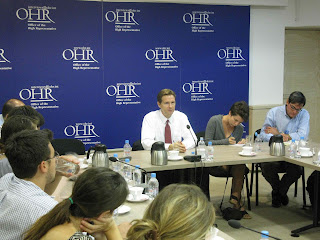Election Day(s) in Egypt - a new President?
Egypt's political system continues to shock and surprise us.
A few days ago, the supreme constitutional court ruled that the Parliament was not elected according to the constitution, and therefore it was invalid and should be disbanded. The court also ruled that the constitutional assembly, which was supposed to write the new constitution, also was invalid as it was chosen by the Parliament.
Of course, if that were the case, then the presidential elections going on today and tomorrow also should be declared invalid, right? These candidates came out of this process, so why should these two candidates be considered legitimate?
Egypt's military (SCAF - the supreme council of the armed forces) holds all power - "SCAF" is the president and it has assumed (as of yesterday) all legislative powers and control over the budget. It will appoint the 100-member constituent assembly, to write the new Constitution. The only check on the executive and legislative powers is the judiciary - but is this, too, under direct influence of SCAF? It seems so.
If Ahmad Shafiq gets elected president today and tomorrow, many of us fear that he will be an "emperor" (as Mohammed ElBaradei has said), with more power than Mubarak held at the height of his power. Egypt has no constitution; no legislature in place. A "President Shafiq", who served Mubarak and comes out of the military (Air Force), is likely to be more loyal to the military than to "the people" of Egypt.
If by some strange fortune, the Muslim Brotherhood candidate Mohammed Mursi wins, he will almost certainly have no real powers. SCAF will continue to find ways to undermine him (personally) and his Islamist brothers and hold effective power rather than transfer any to a "President Mursi".
Egypt is a mess. So why should we be surprised? It's raw power politics played skillfully by the military, which we should by now recognize has no intention of "going back to the barracks" in any real manner.
A few days ago, the supreme constitutional court ruled that the Parliament was not elected according to the constitution, and therefore it was invalid and should be disbanded. The court also ruled that the constitutional assembly, which was supposed to write the new constitution, also was invalid as it was chosen by the Parliament.
Of course, if that were the case, then the presidential elections going on today and tomorrow also should be declared invalid, right? These candidates came out of this process, so why should these two candidates be considered legitimate?
Egypt's military (SCAF - the supreme council of the armed forces) holds all power - "SCAF" is the president and it has assumed (as of yesterday) all legislative powers and control over the budget. It will appoint the 100-member constituent assembly, to write the new Constitution. The only check on the executive and legislative powers is the judiciary - but is this, too, under direct influence of SCAF? It seems so.
If Ahmad Shafiq gets elected president today and tomorrow, many of us fear that he will be an "emperor" (as Mohammed ElBaradei has said), with more power than Mubarak held at the height of his power. Egypt has no constitution; no legislature in place. A "President Shafiq", who served Mubarak and comes out of the military (Air Force), is likely to be more loyal to the military than to "the people" of Egypt.
If by some strange fortune, the Muslim Brotherhood candidate Mohammed Mursi wins, he will almost certainly have no real powers. SCAF will continue to find ways to undermine him (personally) and his Islamist brothers and hold effective power rather than transfer any to a "President Mursi".
Egypt is a mess. So why should we be surprised? It's raw power politics played skillfully by the military, which we should by now recognize has no intention of "going back to the barracks" in any real manner.



Comments
Post a Comment